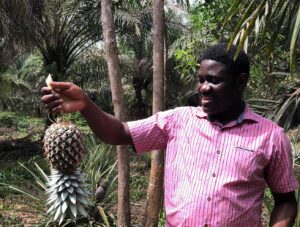Food security in Sierra Leone is a national priority. Our intervention in agriculture contributes to the achievement of food sufficiency in Sierra Leone.
SEP agriculture projects at Makonkarie are on the right footing. SEP negotiated with the people of the village for 146 acres of land for the development of SEP agriculture initiative. SEP hired the services of an agriculture specialist to provide the right expertise to the plantation using indigenous human and other resources like tools and seeds to advance the agriculture project, and ensure monitoring and supervising of planting, and preparation of nursery beds.

Following the advisory report from the agricultural specialist, 50 acres of additional land was brushed setting the foundation for our agricultural ambition to plant sorghum and cassava.
Furthermore, we are at an advanced stage with the person in charge of the sorghum-planting project at The Sierra Leone Brewery. We have been enlisted as this year’s beneficiaries of the sorghum seed, that is needed in the production of beer.
In the same vein, our palm plantation is on 46 acres of land with different varieties including the dura and tenera varieties from improved seeds. During this period, a strategy to keep the palm plantation accessible was implemented by ensuring thorough cleaning of all areas of palm trees: This close monitoring and supervision contributed to the increase in palm oil yields compared to the previous years: an estimated two drums of palm oil were harvested and sold.
The revenue was used to buy materials to support the primary school at the Makonkarie. Some of the palm oil was sold to support the farm activities in the form of providing an incentive to the full-time laborers on the farm. SEP also succeeded in mobilizing 40 youths at the village to work on the plantation seasonally as needed. In return they get incentives for their work, serving as a stable source of income for many youths at the village.
Plan for 2022-2023
The plantation needs a study that identifies how SEP can develop a sustainable profitable business from the plantation’s produce. The study will need to focus on value chain development and entering market niches to position and sell products from our plantation.
The outcome of this study should offer advice on ways to actively involve the local farmers in the preparation, implementation and evaluation of the learning community centered on the business skills and technical skills (farming and processing) or move up the value chain.
